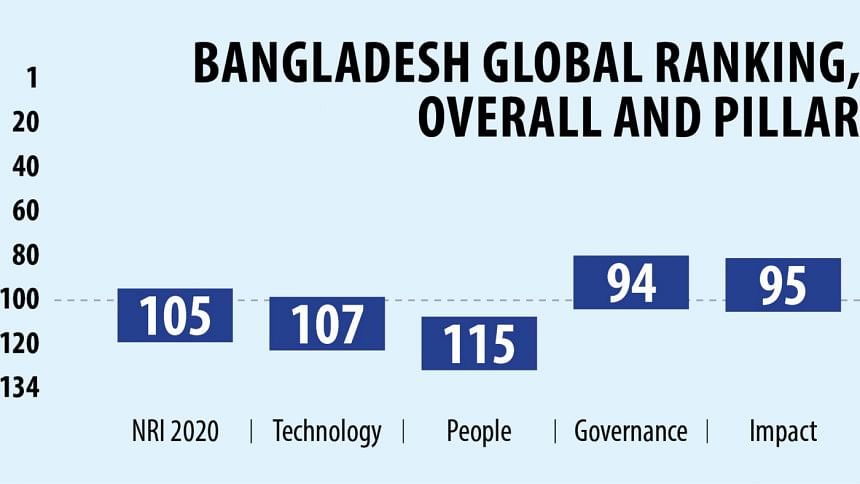Preparing Bangladesh for the Fourth Industrial Revolution (4IR)

The world is witnessing a not-so-silent revolution. Unlike other revolutions, this one is taking place in bits and pieces. Some parts of the revolution have already progressed far in some countries or regions, while many countries wonder how to move ahead in the game. Yes, I am talking about the Fourth Industrial Revolution or 4IR that is poised to change how we experience technology, understand the economy, avail services and do our jobs. With the introduction of the "Digital Bangladesh" ideology, the government had started to take steps in the right direction. However, with the rapidly changing technology scenario, the government needs to be flexible, forward-thinking, inclusive and proactive to prepare Bangladesh to reap the benefits of more than a decade's drive towards digitisation.

To begin with, 4IR is largely about digital technologies and how these technologies can be managed. There need to be proper policies to govern the use and development of emerging technologies. Regrettably, Bangladesh is not in a position to formulate policies fast. It takes years to formulate or revise policies. Another challenge is the severe shortage of qualified human resources who can appropriately support policymakers to develop and revise policies faster per the changes or developments in the international policies or technology development. If we think that we will be able to address the challenges of the 4IR by only revising policies formulated in the colonial era, then we are very wrong. The policies developed during the colonial period had different purposes, and digital technologies were not even dreamt of by the policymakers of that time. For the twenty-first century and the 4IR, we will need policies that are developed to address the challenges that come with 4IR -- for connected economies, data protection, trans-border online trade, virtual currency, digital economy, ethical use of AI, IP Protection, digital currency, virtual products, start-up ecosystem, digital financing, trans-border cybercrimes and many other emerging phenomena that are yet to be defined. The good news is that some policies have already been formulated, and some are being formulated. Nonetheless, those are nowhere near meeting the requirement.
An indication of how we are doing in technology governance can be found in one of the most comprehensive rankings, the Cisco Digital Readiness Index. Bangladesh ranked 126th out of 141 countries in the Ease of Doing Business Index in 2019, whereas the overall rank was 108th. Attracting investments from the tech giants shaping the 4IR would be crucial for Bangladesh to stay ahead in the competition. The businesses will be driving the 4IR; hence the government needs to ensure a conducive environment to encourage global businesses to invest. We have already seen how changing policies can build industries. For instance, the change in the taxation policies has allowed the emergence of mobile phone manufacturing in Bangladesh. Cash incentive policy on IT/ITES export has increased the revenue of the whole industry. Drawing from these practical examples, the government must focus on formulating relevant policies and subsequent laws and ensure the implementation. We also can't forget that any policy or law without enforcement has no value. The recent e-commerce fiasco is a gentle reminder of this.
The discussion on the policy issues brings out the second enormous concern regarding Bangladesh's preparedness for 4IR. Every technology business in Bangladesh suffers from a shortage of skilled human resources. There is absolutely no shortage of human resources in Bangladesh. The challenge is with the skilled part. It may sound unreal but, the fact is, almost every technology company is eager to hire highly skilled people with handsome salaries. However, there is hardly anyone skilled enough in the market to take those jobs. The 4IR will give rise to this issue even more. The demand for skilled people will soar. However, the present system of churning out graduates or certificate holders will not meet the demand. One of the significant facts about the 4IR is that it will reduce 4D jobs. These are jobs that are dumb, dull, dirty and dangerous. Many new jobs will be created, and there will be a rapid increase in the demand for highly skilled people who can develop solutions, work with new technologies, learn new skills regularly, and develop technology solutions for 4D jobs. The most concerning part for Bangladesh is that the level of skills is nowhere near where it needs to be to get the benefits of 4IR.
In fact, if we go back to the Cisco Digital Readiness Index 2019, we can see that Bangladesh ranked 118th for people, and if we look into the Network Readiness Index (NRI) 2020 by the Portulans Institute, we will see that the rank for people is 115th. These two indicators tell us that whatever we are doing to produce skilled resources for 4IR or the technology sector is not working. This calls for the government to rethink and establish a mechanism/body that will dedicatedly work to ensure the supply of skilled resources, provide guidelines to reduce the demand-supply issues, bring academia and businesses closer and reskill/upskill the existing resources with appropriate skills.
The most talked-about part of the 4IR is the physical infrastructure to support the adoption and growth of the technologies. Hence the revolution needs R&D centres and knowledge-based technology-specific hubs to be established that can lead the development of home-grown technologies and collaborate with pioneering innovators globally to develop practical solutions to business problems. Along with these, the requirements for high-speed internet connectivity throughout the country will significantly increase. In the last four years, we have progressed considerably in ensuring broadband connectivity at the district levels. Still, to ensure the full benefit of 4IR, we will require high-speed internet connectivity at the union/village levels. The positive thing is that the government has undertaken multiple projects, and it seems that in the next few years, broadband connectivity will improve significantly in rural areas. Another essential part will be to have robust data centres that can support the government requirements and serve the businesses. It will be crucial to engage the global leaders in cloud storage like Amazon, Microsoft, and Google to develop data centres in Bangladesh. If they are not interested in developing data centres, establishing collaborations with them to develop the local capacity will be the alternative. The government has already established Tier 4 and Tier 3 data centres, and their capacity has increased significantly. However, to realise the benefits of 4IR, these physical establishments need to be on par with their international counterparts in terms of services offered and their quality. Another salient aspect of 4IR is 5G connectivity. 4IR will be launched on the 5G platform. The implementation of 5G will enable businesses to access high-speed data transfer on the go. So, ensuring 5G is offered at an affordable cost may become one of the necessary prerequisites of the 4IR.

Finally, we must recognise that the 4IR is looming just around the corner. It is a grave concern that we might get caught unprepared in some areas. To prepare for the 4IR, Bangladesh's approach needs to be holistic. It is too big of a challenge to be tackled by one ministry or agency. The 4IR will impact not only the IT industry, but also education, agriculture, manufacturing, health, economy, services, and many other areas. This is a challenge of global magnitude, and all the ministries need to collaborate to ensure that they are doing their part to make Bangladesh ready to ride the wave. At the same time, it is also falling on the shoulders of the businesses and trade bodies to do their part by engaging the government to create a win-win situation for everyone. These are uncertain times, and the pandemic has accelerated the pace of 4IR as dependency on technology has increased very quickly. Thus, the speed of the readiness of Bangladesh needs to accelerate to ensure we are fully prepared when the time comes.
Md Asad-Ur-Rahman Nile is the Country Director of Simprints Technology Ltd.

 For all latest news, follow The Daily Star's Google News channel.
For all latest news, follow The Daily Star's Google News channel. 



Comments